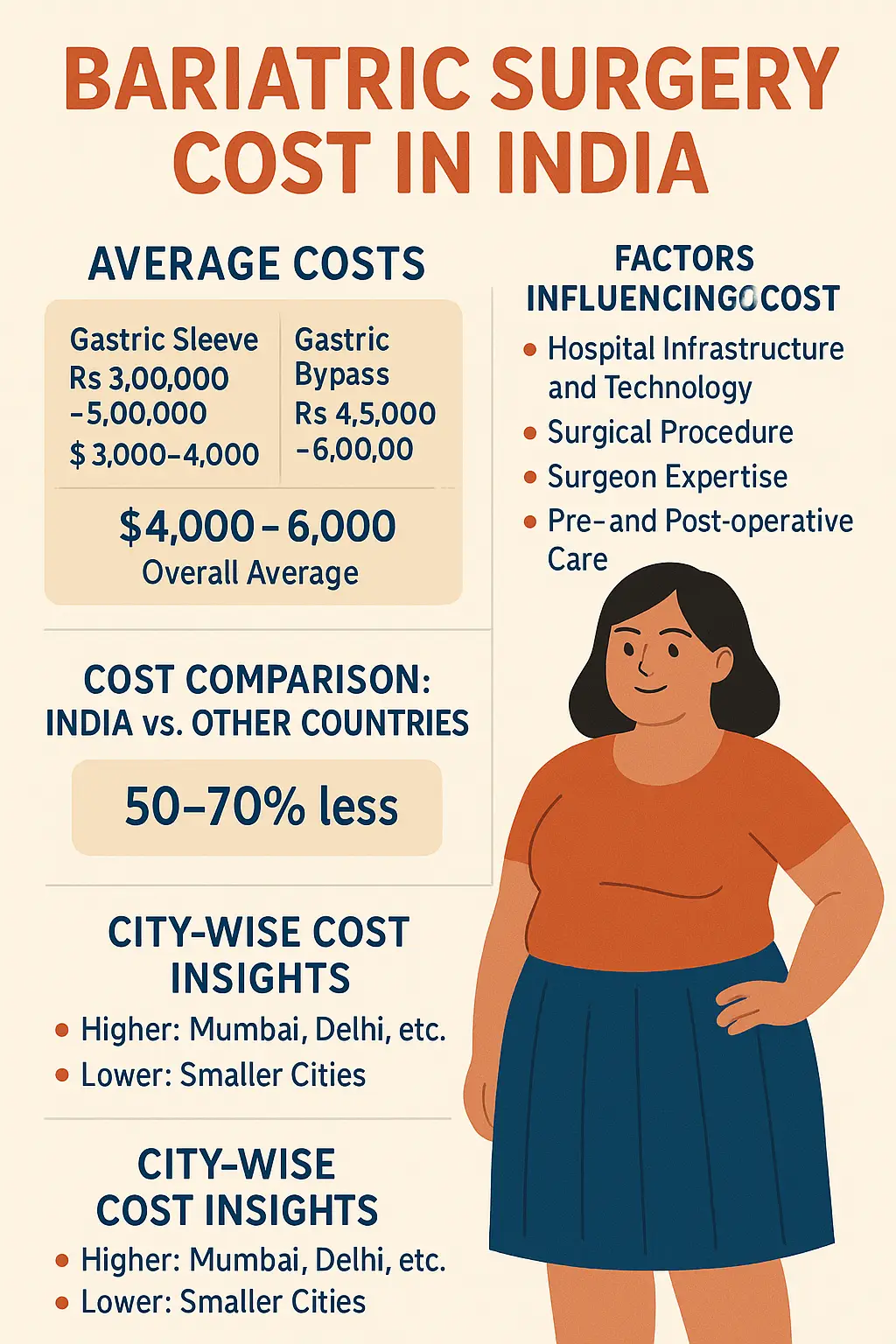Bariatric Surgery Cost in India: 2025 Pricing Guide, Factors & Savings
Looking for the true bariatric surgery cost in India? This guide explains typical price ranges for gastric sleeve and gastric bypass in both INR and USD, why prices vary by hospital and city, and how India compares with Western countries. You’ll also find a quick cost checklist and FAQs to help you budget with confidence.
Key Takeaways
- Bariatric surgery cost in India is generally 50–70% lower than in many Western countries.
- Typical pricing (procedure-dependent): gastric sleeve is often cheaper than gastric bypass.
- Costs vary by hospital tech & infrastructure, procedure type, surgeon expertise, and pre/post-op care.
- Metro cities (Mumbai, Delhi, Bengaluru, Chennai, Hyderabad) tend to be pricier than smaller cities.
Average Bariatric Surgery Costs in India
Actual pricing depends on your hospital, city, surgeon, and care package. These common ranges can help you benchmark:
| Procedure | Typical India Price (INR) | Typical India Price (USD) | Notes |
|---|---|---|---|
| Gastric Sleeve (Sleeve Gastrectomy) | ₹3,00,000 – ₹5,00,000 | $3,000 – $4,000 | Reduces stomach size ~75% by removing a large portion |
| Gastric Bypass (Roux-en-Y) | ₹4,50,000 – ₹6,00,000 | $5,000 – $6,000 | Creates small pouch & reroutes small intestine to limit intake/absorption |
| Overall Average (India) | Varies by package | $4,000 – $6,000 | Bundles are common; inclusions differ by hospital |
Why the spread? Packages differ in room class, length of stay, diagnostics, anesthesia, and follow-up support.
Factors Influencing Bariatric Surgery Cost in India
- Hospital Infrastructure & Technology – State-of-the-art facilities and advanced equipment increase costs, but also expand surgical options across price points.
- Surgical Procedure – Sleeve vs. bypass differs in complexity, duration, consumables, and implants—all impacting price.
- Surgeon Expertise – Highly experienced surgeons typically charge more due to proficiency and success rates.
- Pre- & Post-Operative Care – Consultations, diagnostics, medications, nutrition counseling, and structured follow-ups add to the total.
India vs. Other Countries: How Much Can You Save?
Many patients choose India for its combination of affordability and quality care. Typical savings compared to Western nations can be substantial—often 50–70% less. For context, comparable procedures can reach up to ~$20,000 in the US/UK, versus ~$4,000–$6,000 for average packages in India.
City-Wise Cost Insights
- Higher ranges: Mumbai, Delhi, Bengaluru, Chennai, Hyderabad (more renowned centers and senior surgeons).
- Lower ranges: Smaller cities (fewer overheads; still compare hospital quality and outcomes).
What’s Usually Included in the Price?
Hospitals often offer bundled packages. Typical components include:
- Surgeon, anesthesia, and operating room fees
- Hospital stay (room class affects price)
- Pre-op consultations and diagnostic tests
- Medications and immediate post-op care
- Follow-ups and nutrition counseling (varies by package)
Results & Recovery (Price Context)
Beyond the numbers, patients commonly report meaningful health improvements after bariatric surgery. Many experience steady weekly weight loss early on and may lose ~70–80% of excess weight within ~8 months, with weight stabilizing thereafter. Recovery typically progresses from fluids to soft foods, then to small, frequent solid meals as stomach capacity adjusts—factors that can influence the scope of post-op support included in your package.
How to Estimate Your Total (Quick Checklist)
- Choose your procedure (sleeve vs. bypass) and shortlist hospitals.
- Confirm package inclusions (tests, meds, length of stay, follow-ups).
- Ask about surgeon fees and any add-on costs (ICU, extended stay).
- Consider city premiums for metro centers vs. smaller cities.
- Request final written quotations from at least 2–3 hospitals to compare like-for-like.
Bottom line: Bariatric surgery cost in India is competitive globally, with packages designed to balance affordability and quality—especially when you compare total care (pre-op to post-op) against Western pricing.
FAQs: Bariatric Surgery Cost in India
What is the average bariatric surgery cost in India?
Overall packages often range around $4,000–$6,000, depending on hospital, city, surgeon, and inclusions. Gastric sleeve commonly runs $3,000–$4,000, while gastric bypass is typically $5,000–$6,000.
How much does gastric sleeve cost in India in INR?
₹3,00,000 – ₹5,00,000 in many hospitals, varying by city, hospital infrastructure, and package scope.
Is gastric bypass more expensive than gastric sleeve?
Usually yes. Bypass is typically $5,000–$6,000 (often ₹4,50,000 – ₹6,00,000), reflecting greater complexity and OR time.
Why is bariatric surgery cheaper in India than in the US/UK?
Lower operating costs and competitive healthcare markets. Many Indian hospitals offer bundled packages that keep pricing transparent and controlled—often 50–70% less than Western averages.
What factors most influence my final price?
Hospital infrastructure & technology, procedure type (sleeve vs. bypass), surgeon expertise, and the scope of pre/post-op care included in your package. City choice also matters.


